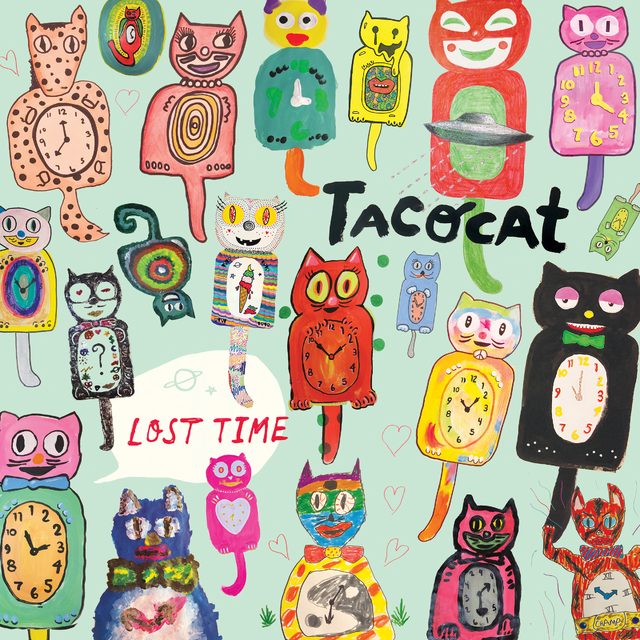If NVM is Tacocat’s Nevermind—the album that brought them to the world’s attention—then Lost Time is the Seattle band’s In Utero: heavier, darker, realer, and produced to pack a stronger punch. On this, their second Hardly Art release, Tacocat worked with producer Erik Blood (the Steve Albini in this metaphor, but way cooler than Albini) to create a sound that’s both deep and precise.
With Blood on the tracks, the lead vocals by Emily Nokes shimmer and flare with fullness. Instruments get a powerful new resonance and breathing room. Lelah Maupin’s drums boom; Eric Randall’s guitar and Bree McKenna’s bass get their proper space to shine.
Lost Time, its cover ticking with kitty-cat clocks, is a record about facing reality. “The world is ending,” they sing in “I Love Seattle,” followed by “Yeah, yeah. We already know.” Party’s over. They’ve moved on to the afterparty, a more intimate and honest gathering. But the band’s smart sense of humor and catchy melodies are still here to ease the reality-check medicine. What we’re hearing is Tacocat at their sharpest.
“There must be an explanation,” begins “Dana Katherine Scully,” an opening-track ode to Our Lady of Skeptics with her “no-nonsense attitude.” Nokes’ notes dip and bend with gorgeous clarity, while the restrained build-up to the chorus and careful reverb create a foreboding feel to set the record’s tone.
“There’s a monster every single week/Lost time and ghosts in the machine” refers not only to X-Files episodes, but also to the album’s recurring theme: pointing out (then poking fun of) sexism in its many sneaky forms. Misogyny is the “monster” that predictably pops up to sap women’s time and energy. “Ghosts in the machine” are online trolls and anonymous harassers, which the band directly addresses on track six, “The Internet”: “Hate from the insecure/When you’re anonymous, no consequence to fear.”
On “Men Explain Things to Me,” a song that shares its name with an essay by feminist Rebecca Solnit, Tacocat takes on mansplaining and gaslighting: “Tell me to calm down again … My feelings won’t subdue just because you told them to/You’re a cliché.” They twist the stereotype of humorless, angry feminist to shine a neon light on the true bores: tiresome mouthpieces of patriarchy—in the office and the street—who “take up the whole sidewalk again.” And they have fun doing so.
“I Love Seattle” acknowledges the predicted Big One that’ll shove the city “into the sea,” yet chooses to embrace Seattle anyway. The mismatch between the song’s natural-disaster subject matter and upbeat pop pace is chuckle-worthy. There’s no escapist desire to build a “Bridge to Hawaii” anymore.
Lost Time’s menstrual jam “FDP” (First Day Period) is an anthem about the worst of the worst: the first-day period gush of blood and agony. Instead of wishing for a day at the beach and “white wine and Vicodin” to numb the pain (as NVM’s “Crimson Wave” called for), this song’s cramp sufferer just needs space, warning: “FDP! Don’t fuck with me!”
Tacocat is still down to celebrate. But on Lost Time the band is looking for more meaningful, private festivities. “Night Swimming,” a surfy song with R.E.M.-nodding guitar (and an actual line about R.E.M.) is about a smaller huddle, away from the summer sun: “Don’t care for crowded beaches … There’s no one else in sight, just our friends.” Goth beach!
The strongest songs on the album are tracks that stretch new muscles for the band, both sound- and lyric-wise. Tacocat dives into the deep end of human desire with “Talk”: “Together, together alone/Stay true, true to your phone” expresses a craving for body-and-sweat connection in a digital world where our beloveds’ faces are ”lit by a screen,” their attention divided.
Nokes’ vocals sound isolated, conveying a sense of distance as she pleads to be heard and touched—in real time. Backed by eerie guitar, “Talk” builds to a be-here-now howl. Blood’s technical work makes this stormy jewel shiver with skin-on-skin handclap effects, giving the track an erotic industrial mood reminiscent of Nine Inch Nails’ “Closer” or early Depeche Mode.
“Talk” causes chills; so does “You Can’t Fire Me, I Quit,” a break-up song whose “oh-oh-oooh”s float in from a haunted 1950s dance. “You’re not breaking up with me … I’m breaking up with you, actually.” In that one drawn-out word, “actually,” Nokes’ elevator hits 19 distinct floors of emotions, mirroring the raw, conflicting feelings that a harsh breakup can conjure.
With a wider range of feelings and thoughtful sonic effects, Tacocat proves that punk truth-telling can still be a good time. The passion and vulnerability on Lost Time are beautifully relatable. We could die at any time, they say. So let’s hold each other as we save what’s “still worth defending” and fight ignorance with humor. Tacocat Release Show: Chop Suey, $10 adv./$12 DOS. (All ages show at 6 p.m., 21 and up at 9 p.m.) Thurs., March 31.










